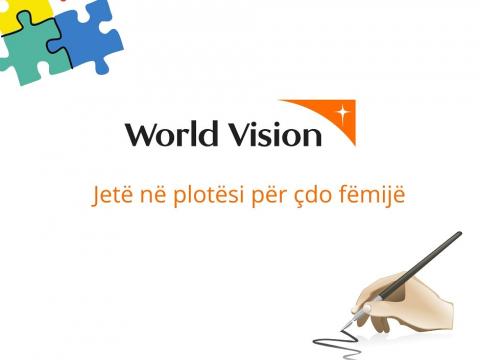Social justice and child wellbeing in Albania

February 20th marks World Day of Social Justice. Whilst, the date is often deliberated as an opportunity to give messages that promote social justice, we might also take advantage of the occasion and bring to attention what World Vision Albania comprehends by "social justice". Generally, it looks like social justice is a concept closely related to justice itself and vulnerability, as one of its preconditions.
As an organization working in the field of child protection, World Vision endures the burden of promoting ethical social justice, with the ultimate goal of advocating for and guaranteeing the well-being of children. Although a broad concept, social justice is first and foremost closely linked to the protection and respect of human rights. And when it comes to children, as one of the vulnerable groups of our society, such issue becomes both necessary and urgent. The Albanian law for guaranteeing the rights and protection of children, defines in Article 2, as follows:
c) guaranteeing the well-being and improving the quality of life of children, by promoting and enabling their development in society, effective assistance and care for the child, whose health and well-being is at risk;
ç) taking all necessary measures to ensure that the child exercises all his/her rights, in accordance with his/her personality development, based on child’s best interest. However, during World Vision’s 21 years of work experience in Albania, our society has often been showed to be unsuccessful in protecting children. A society that fails to protect and guarantee human rights (including children) can never be a just society.
A just society creates all the necessary opportunities and facilities so that all its members can access services such as: housing, food, health, employment, education, protection services, and etc. as per need. If access to services is restricted for reasons related to factors such as economic status, age, gender, ethnicity, or a particular physical or psychological disability, then there is no such a thing as social justice or is limited. Data from the assessment conducted during 2020 by World Vision Albania regarding the impact of COVID-19 on families in our country, show that: 62.6% of families included in the study stated that their children did not receive psycho-social support during quarantine.[1]
Such data show we still have work to do in achieving equality of the right to access services and collective solidarity.
Social justice is not possible if only the voices of a few are heard. Unfortunately, vulnerable groups often find it difficult to convey their voice to policymakers or decision-makers. Even when the latter try to provide certain solutions to issues that concern marginalized groups, they run the risk of providing solutions that are not entirely appropriate. During its 21 years of work in Albania, World Vision has paid extraordinary attention to the participation of children in processes that affect their lives. WVA has also promoted engagement with vulnerable groups to bring social change. We strongly believe that community transformation cannot be one-sided, and consequently it cannot happen if community members and children are not having their say and embrace this transformation.
Finally, social justice is closely related to equity, which means creating equal opportunities to all citizens. Although it does not guarantee equal achievements and finish, it remains a quite important element as it takes into account the differences and limitations that the individual may encounter in achieving his/her full potential. COVID-19 pandemic is putting children in higher risks, thus exacerbating inequalities, especially for vulnerable groups. World Vision's assessment on the impact of the pandemic on children and their families, indicates that as a result of the pandemic, 43 percent of participants who own agricultural land report that the situation created by COVID-19 has affected the sale of their agricultural products. The pandemic is expected to bring further pressures on family finances and participants express concern about the issue.[2]
In this regard, apart from the need to intervene with a large-scale national job creation schemes (with special focus on women, poor communities, disability, communities living in suburban areas) to rapidly absorb the increasing number of unemployed people, there is a need to help the local economy recover, in particular small-scale agricultural production, through value chains and broader food systems. There will be a need to increase capital investment in micro-level financial services (microcredit) targeted at key parts within agriculture value chains.
Sustainable development and building a better world, requires investment in knowledge, human resources, financial capital, etc. In a new reality we are living in, due to the pandemic caused by COVID-19, social justice requires focus also on other elements related for example to the digital way of living and working. We are aware that the above is by no means exhaustive. We are also aware that there is no one and universally accepted definition of social justice. Finally, it is important to say that the above are the stand of World Vision Albania which ultimate goal is: achieving the well-being of children in our country.
Diana Kanaj, Child Protection Technical Advisor
[1] https://www.wvi.org/sites/default/files/2020-06/COVID_Assesment_Report_WVA_final.pdf
[2] https://www.wvi.org/sites/default/files/2020-06/COVID_Assesment_Report_WVA_final.pdf